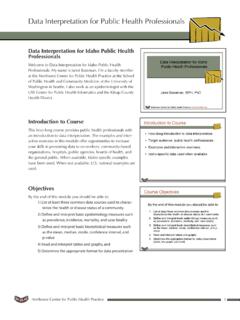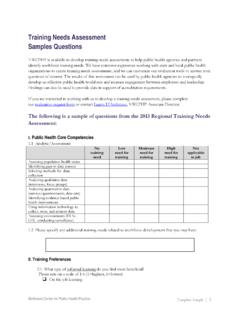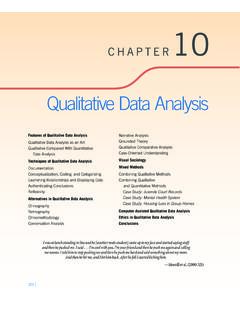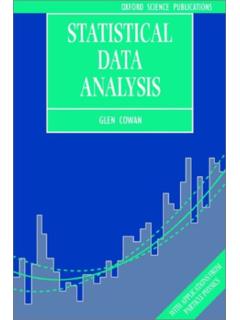Transcription of Northwest Center for Public Health Practice
1 data collection for Program EvaluationNorthwest Center for Public Health PracticeIntroductionThis toolkit offers some additional information, templates, and resources to assist you in planning your own data collection for program evaluation. General EvaluationProgram evaluation is a systematic way to collect information about the characteristics, activities, and results of a program in order to make deci-sions about the program. Evaluating a program helps you determine whether it is functioning as intended, or meeting its goals and objec-tives, and may help you identify areas for improvement. At NWCPHP we use the CDC s Evaluation Framework to guide our Practice . The CDC Evaluation Framework is described in our online module Program Evaluation in Public Health .
2 Information about the framework and related resources are at #summary. ResourcesIntroduction to Program Evaluation for Public Health Programs The CDC also offers a 92-page self study guide, which includes worksheets and checklists for implementing the steps in the Health Agency of Canada s Evaluation Toolkit includes specific infor-mation about how to plan for, design, conduct, and use the results of program evaluations. The toolkit is divided by topic area, and includes many worksheets and tools that you can print out for use in your organization. site also has blank worksheets to help you establish your evaluation ques-tions and your data collection plan, identify stakeholders, and interpret your findings.
3 The Practice of Health Program Evaluation (2001) For more advanced evalu-ators, or for people interested in further study, Dr. David Grembowski s book provides a thorough and academic discussion of program evaluation. The chap-ters most closely related to this course are: Chapter 3 Developing Evaluation Questions, Chapter 8 Measurement and data collection , Chapter 9 data Analysis, Chapter 10 Disseminating the stakeholdersDescribe the programUtilityFeasibilityPropriety AccuracyFocus the evaluation designGather credible evidenceJustify conclusionsEnsure use and share lessons learnedData collection for Program Evaluation 2 ExampleWord version of sample templateOverview of data CollectionThis course focuses on step 4 of the CDC Framework: Gather Credible Evidence.
4 There are many different methods for gathering data . You should select the method that best suits your needs. ResourcesKellogg Foundation s Evaluation Handbook describes data collection methods in more detail than this course was able to cover. (see pages 69 96) The Power of Proof: An Evaluation Primer provides information about prepar-ing to collect data , the different methods for collecting data , as well as tips for best Practice . While this resource is designed for evaluating tobacco prevention and cessation programs, it is applicable to other areas of Public Health Institutional Review Boards When you design your program evaluation, it is important to consider whether you need to contact an Institutional Review Board (IRB).
5 IRBs are found at most universities and other large organizations that receive federal funding (such as hospitals, research institutes, and Public Health departments). An IRB is a committee of people who review proposed projects to ensure that the principles of autonomy, beneficence, and justice are honored. Evaluation PlanProgram: Date: Evaluation QuestionIndicatorsData Source/MethodPerson ResponsibleTimelineData collection for Program Evaluation 3It is a fine line between evaluation and research, so it is important that you consider human subject protections every time your evaluation involves obser-vations of people, interviews, surveys, or the collection of people s personal Health information.
6 The Washington State Department of Health developed the decision tree below to illustrate the difference between research and non-research. In general consult an IRB ifYour evaluation involves getting information from or about people Your institution or any of your collaborators receive federal funds You hope that the findings of your evaluation can inform other programs Is It Research or Public Health Practice ?What is the primary intent?If the project involves human subjects, is intended to generate or contribute to generalizable knowledge to improve Public Health Practice , and the benefits extend to society, then the project is the project is intended to prevent a disease or injury and improve Health (or to improve a current, on-going Public Health program or service)
7 And it benefits primarily the participants, it may be project involves data collection /use for the purpose of assessing community Health status or evaluating an established program s success in achieving its objectives in a specific the project involve vulner-able populations or collect sensitive/personal information?If yes, informal consultation with WSIRB is recommended. no, complete the Questions to Consider When Using Human Participants in Public Health Assessment & Evaluation and follow your department s project is an evaluation of a new, modified, or previously untested interven-tion, service, or your agency s designated IRB and describe the proposed project in IRB staff determine the project meets criteria for exemption, IRB review will be collection for Program Evaluation 4 They will help you determine whether you are doing research, whether your research actually involves human subjects.
8 And whether your research may be exempt from human subjects regulations due to lack of risk to State Department of Health Human Subjects Guide University of Washington Human Subjects Division Human Subjects Division FAQ The Belmont Report discusses law related to ethical treatment of human collection for Program Evaluation 5 data collection methods MethodUse whenAdvantagesDisadvantagesDocument ReviewProgram documents or literature are available and can provide insight into the program or the evaluationData already exist Does not interrupt the programLittle or no burden on othersCan provide historical or comparison dataIntroduces little bias Time consuming data limited to what exists and is availableData may be incomplete Requires clearly defining the data you re seekingObservationYou want to learn how the program actually operates its processes and activitiesAllows you to learn about the program as it is occurringCan reveal unanticipated information of valueFlexible in the course of collecting dataTime consuming Having an observer can alter eventsDifficult to observe multiple processes simultaneouslyCan be difficult to interpret observed behaviorsSurveyYou want information directly from a defined group of people to get a general idea of a situation.
9 To generalize about a population, or to get a total count of a particular characteristicMany standardized instru- ments availableCan be anonymous Allows a large sample Standardized responses easy to analyzeAble to obtain a large amount of data quicklyRelatively low cost Convenient for respondents Sample may not be representativeMay have low return rate Wording can bias responses Closed-ended or brief responses may not provide the whole story Not suited for all people , those with low reading levelInterviewYou want to understand impressions and experiences in more detail and be able to expand or clarify responsesOften better response rate than surveysAllows flexibility in questions/probesAllows more in-depth infor- mation to be gatheredTime consuming Requires skilled interviewer Less anonymity for respondentQualitative data more diffi- cult to analyzeFocus GroupYou want to collect in-depth information from a group of people about their experi-ences and perceptions related to a specific multiple peoples input in one session Allows in-depth discussion Group interaction can produce greater insightCan be
10 Conducted in short time frameCan be relatively inexpen- sive compared to interviewsRequires skilled facilitator Limited number of ques- tions can be askedGroup setting may inhibit or influence opinionsData can be difficult to analyzeNot appropriate for all topics or populationsData collection for Program Evaluation 6 Document ReviewWhen evaluating a program it is helpful to review existing documents to gather information. You can review meeting minutes, sign in sheets, quarterly or annual reports, or surveillance data to learn more about the activities of the program and its reach. You can also review related scientific literature or Web sites to learn how other similar programs work or what they accomplished.







